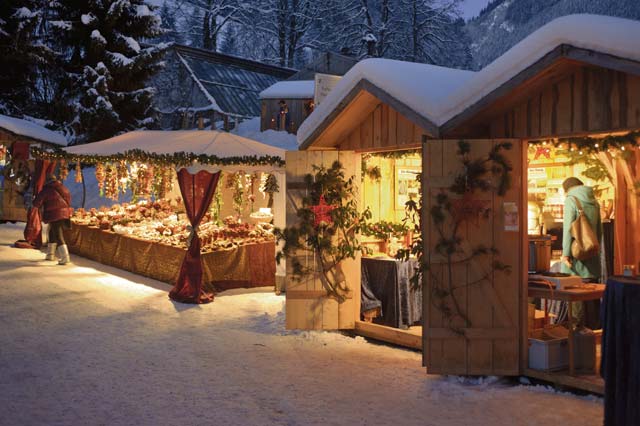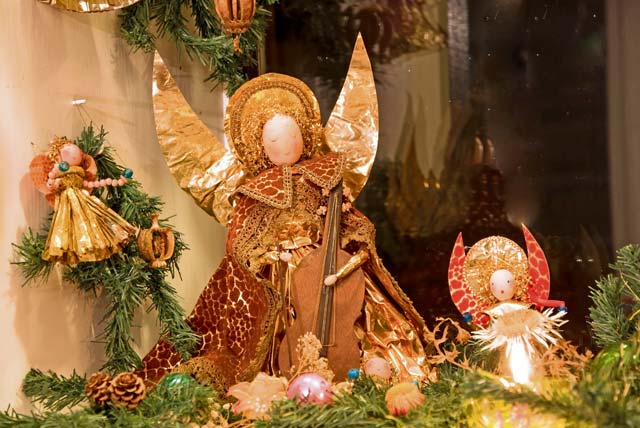

Kristina Robinson grew up in Nuremberg, Germany, celebrating Christmas according to local traditions. Traveling with her Army husband, Robinson has come to celebrate holidays in keeping with whatever country they are living in at the time.
The primary difference Robinson noted is when presents are opened. While living in the United States, the Robinsons open their presents on Christmas Day, but when in Germany, the children open all of their presents on Christmas Eve.
Christmas preparations began toward the end of November for Robinson and her family growing up.
“That is when we put up our decorations and the Christmas wreath,” Robinson said.
Many German families begin the celebration of Christmas with the first Sunday of Advent, lighting symbolic candles each week leading up to Christmas.
Christmas cookies, gingerbread houses, Nativity scenes and carved, wooden nutcrackers are all staple traditions in German homes. Cities will often light the streets and decorate their town squares in preparation for the holidays.
Robinson enjoys traditional German Christmas markets, which open toward the end of November with their festive food, decorations and unique vendors.
“I was born and raised in Nuremberg, Germany, which is known worldwide to have the best Christmas market — and I agree,” Robinson said.
Robinson made personalized stockings for each member of her family, and they also decorate with special ornaments.
“I like to decorate the house with a few ‘Weihnachtssterne,’ a plant that adds to the Christmas feel,” Robinson said. “It is also called Adventsstern or Poinsettia. As a child, we also had a Christmas pyramid — a wooden pyramid with different levels and decorations on it.”
A propeller on top would spin from the heat of candles lit on each level. For more information on the Christmas pyramid, see Page 2.
Christmas holiday traditions in Germany include several special days, rather than just Christmas Eve and Christmas Day.
On Dec. 6, many German families celebrate “Sankt Nikolaus Tag,” or Saint Nicolas Day, a day commemorating the legend of the historic figure who was known for giving gifts.
“We would put our freshly scrubbed winter boots outside our room the night before, and in the morning they would be filled with chocolate and a little gift,” Robinson said.
While most of the decorations would have been put up at the end of November, the Christmas tree was saved for last in the Robinson home.
Amid Christmas movies, games, cookies and sweets, childhood anticipation of Christmas gifts and surprises grew stronger for Robinson and her siblings while they waited to be called downstairs on Christmas Eve.
On Christmas Eve all of the children — and even now as adults — would be sent to the second floor to wait together in one room until evening. They would wait there while her parents rearranged the furniture and set up the Christmas tree complete with presents under and around it for their Christmas celebration. The German Christmas tree, or “Tannenbaum,” is generally topped with a Christmas star or an angel figurine.
While traditionally German Christmas trees were decorated with real candles, many families choose to decorate with lights shaped like candles to avoid the fire hazard.
“My mom would come check on us, bring us more snacks and Kinder Glühwein,” Robinson said. “When it was dark outside, we would be told to get dressed. We would wear pretty dresses and suits for the boys. Then my parents would call us downstairs.”
The children all lined up outside the closed living room doors, listening to the festive sound of Christmas carols on the other side — this is Robinson’s favorite Christmas memory, she said.
“My mom would ring a little bell, which means the Christkind (Christ Child) would now come and bring our presents,” Robinson said. “That was always so special, and now as adults it still is!”
After the bell rang, the children were allowed to enter the decorated living room.
“It was magic every time,” Robinson said. “My parents would also burn a little evergreen so the smell, lights and music was just beautiful!”
One year, Robinson recalls a particularly special present.
“I was given a big, purple puppet theater with my name in blue letters written on it,” Robinson said. “It was as tall as I was at that time and had cute curtains so I could open and close it properly.”
After opening their presents — and of course playing with them a little — the family shared a special Christmas meal.
The Christmas Eve feast typically consisted of homemade potato salad, a variety of bratwurst and other sausages that were purchased from the butcher earlier that morning.
“A lot of people like to eat fish as well,” Robinson said.
After the Christmas Eve dinner, the Robinsons continued to celebrate together as a family.
“We would usually watch some Christmas movies together before bedtime,” Robinson said.
On Christmas Day, the festivities continued with a huge breakfast feast and more fun with their presents.
On Christmas Day, traditionally, roasted pork or beef with knödel (dumplings) is served with red cabbage or sauerkraut and gravy.
“My mom would make us try a new homemade dessert each year, which was fun,” Robinson said.
Glühwein was a special Christmas treat to drink. A non-alcoholic substitute, Kinder Glühwein, is also available for the children. Wine and other hot beverages, such as tea, hot chocolate and Christmas Punch, were also served.
“Before lunch we would usually have extended family come for a visit and we would spend some time together,” Robinson said.
That afternoon the family traditionally watched “A Christmas Carol.”
Robinson met her husband, 1st Sgt. Charles Robinson III, in 2002 when he graduated Army Infantry Training and was assigned to his first duty station in Kitzingen, Germany.
“We got married on July 30, 2004, while he was home for R&R during his deployment to Iraq,” Robinson said. “He left a few days after our wedding to finish the second half of the tour.”
After his time in Iraq, the Robinsons lived in Fort Bliss, Texas, from August 2005 through December 2007 and in Fort Sill, Oklahoma, from February 2011 until they moved to the Kaiserslautern area in February of this year.
While in the U.S., the Robinsons incorporated some American traditions into their Christmas celebrations for their children Grace, 8, Charles IV, 4, and Reese, 3.
“I loved the excitement of going to sleep on Christmas Eve knowing that Christmas magic will happen overnight,” Robinson said.
She also grew to love all the American Christmas decorations, including Christmas pajamas and slippers, she said.
“I also enjoy having the tree up the entire month of December,” Robinson said. “It contributes to getting into the Christmas spirit.”
As much as Robinson enjoyed an American flare on her Christmas celebration, she was disheartened with how commercialized the holiday had become in the U.S.
“You would just get bombarded with ads in September and October, and it would put pressure on a lot of families,” Robinson said. “I know a lot of people even take out loans to buy crazy expensive gifts for their kids, and that was just a little sad.”
Regardless of which country the Robinsons are living in, Christmas is a very special time of year in their home.
“The entire month is just magical, and the anticipation just builds up every day,” Robinson said. “Now that our kids are not babies anymore, we make it a priority to teach them the true meaning of Christmas — the birth of baby Jesus. We teach them to be especially kind and giving in the Christmas season.”
Even though gifts remain a wonderful part of the Christmas season, Robinson said she wants her children to realize they are not the most important thing.


